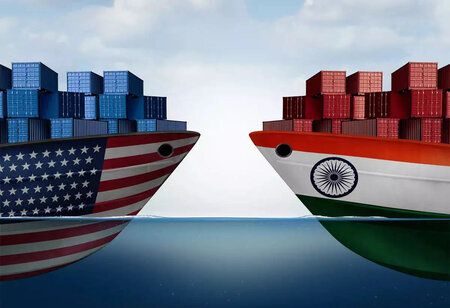By Global Consultants Review Team
 The Indian government is likely to extend targeted support to sectors such as textiles and chemicals that are expected to be severely impacted by the recent US tariffs. Industry sources said the Commerce Ministry has begun consultations with exporters to assess the damage and explore possible support measures under the Export Promotion Mission.
The Indian government is likely to extend targeted support to sectors such as textiles and chemicals that are expected to be severely impacted by the recent US tariffs. Industry sources said the Commerce Ministry has begun consultations with exporters to assess the damage and explore possible support measures under the Export Promotion Mission.
The mission, announced in the Union Budget with an outlay of ₹2,250 crore, aims to boost outbound shipments through various initiatives. These include easy credit schemes for MSMEs, support for e-commerce exporters, overseas warehousing facilities, and global branding strategies to help Indian exporters tap into emerging markets.
The move comes after US President Donald Trump imposed an additional 25% tariff on a range of Indian goods, effectively doubling the duty to 50%. The tariffs, set to take effect from August 27, are a response to India’s continued purchase of Russian oil, according to the US administration.
India’s exports to the US have significant exposure in sectors like textiles, chemicals, gems and jewellery, shrimp, leather and footwear, and machinery. Textile exports alone stood at around $11 billion, accounting for nearly 9% of the US’s total textile imports. Chemical exports to the US amounted to approximately $6 billion.
In FY 2024–25, bilateral trade between India and the US was valued at $131.8 billion, with Indian exports making up $86.5 billion of that total. The new tariffs are expected to disrupt this trade balance, particularly affecting labour-intensive and MSME-driven sectors.
Exporters participating in the ministry’s consultation called for fiscal relief, including interest subsidies, timely disbursal of dues, and extension of incentive schemes like RoDTEP (Remission of Duties and Taxes on Exported Products) and RoSCTL (Rebate of State and Central Taxes and Levies). They also highlighted the need for a direct shipping line to the US and measures to reduce compliance burdens and port charges.
A formal representation has already been submitted to the GK Pillai Committee, which is currently reviewing concerns related to RoDTEP. Exporters have also asked for simplification of advance authorisation norms to ease the export process.
Amid rising global trade tensions, Indian exporters are actively scouting for alternative markets. Export promotion councils and the Commerce Ministry are jointly analyzing options for export diversification. Officials noted that while high tariffs pose short-term challenges, they may also encourage exporters to tap into the domestic market, reducing import dependency and improving India’s trade resilience.
We use cookies to ensure you get the best experience on our website. Read more...